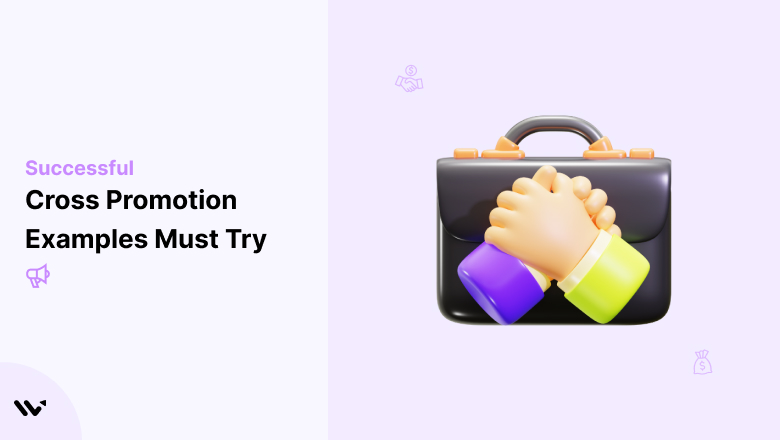Feel like you are doubling your efforts, but your marketing efforts are not getting enough results?
That’s where cross-promotion strategies step in. It’s like teaming up with a partner who helps you amplify reach, engage with your audiences, and skyrocket your results, all without doubling your workload.
Cross promotion is a great marketing tool as its about collaborating with another brand, creator, or even product line to introduce your audience to something they’ll love while tapping into a whole new group of potential customers.
In this blog, we will share 10 Cross Promotion examples brands have used to cut through the noise and drive real, measurable results. Whether your challenge is low visibility, slow customer engagement, or stretched marketing budgets, these strategies can help you set up success for your marketing efforts.
Let’s dive in.
Visitors leave your website without taking action?
They don’t trust your site or feel urgency to act. WiserNotify builds both, turning doubt into action & visitors into customers.

What is Cross-Promotion and Its Benefits
Cross promotion or brand partnership is a strategic marketing technique where two or more businesses collaborate to promote each others products, services, or content.
Think of it as a win-win partnership that allows partner companies to tap into each other’s audiences and expand reach without needing to start from scratch.
Cross-promotion is about aligning with a brand or product that complements yours to create more value for your customers. It’s cost-effective and often feels more organic than traditional advertising.
It’s about collaborating to create a bigger, better customer experience.
Here’s why it works so well:
Boosted Brand Credibility and Trust: Consumers are more likely to trust your brand when it’s recommended by someone they already know and love.
Cost-Effective Marketing: Traditional advertising costs more, but cross-promotion is a budget-friendly strategy.
Expand Audience Reach: Cross-promotion lets you leverage the reach of your partner brand, instantly exposing your product or service to potential customers you may not have reached otherwise.
Increased Sales and Conversions: More visibility means more opportunities to convert. Cross-promotion drives sales by introducing your product to a warm target audience.
Mutual Growth for Brands: Both brands benefit from increased exposure, engagement, and sales, making it a true win-win strategy.
Types of Cross-Promotion
Cross Promotion is a flexible strategy, here are a few effective types of cross promotion to consider:
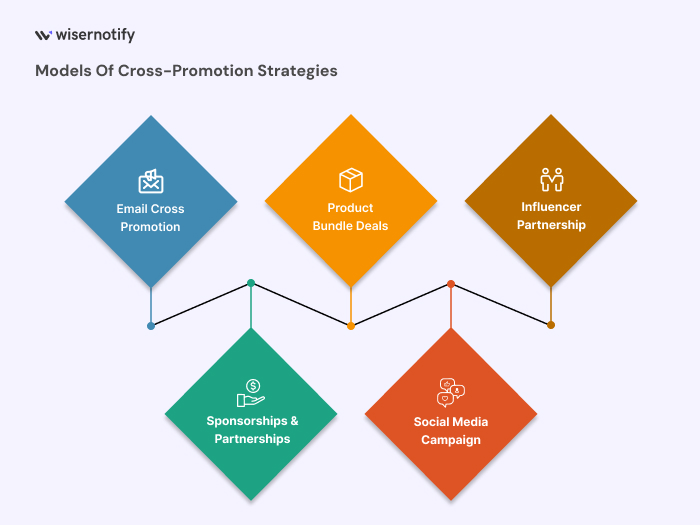
Co-Branding
Co-branding is a collaboration between two brands that generates buzz and attracts customers who love the combined value both brands bring. It’s a unique offering on the strenghts of both brands.
Email Marketing Cross Promotions
By featuring each other in newsletters, brands can introduce products to a pre-warmed audience that’s already engaged and ready to take action. Emails feel personal, and it helps to reach target audiences that trust the brand.
Product Bundle Deals
Product bundling not only boosts sales but also provides value to the customers. Customers love a good deal, and bundling creates a “one-stop shop” experience for them.
Influencer Partnership
An influencer partnership is a brand collaboration with a social media influencer or an expert who promotes the brand’s product or services. They have a strong and loyal community, so their endorsement feels authentic and relatable.
Sponsorships and Partnerships
Collaborating on sponsorships like charity, events, or causes helps to increase brand visibility and builds goodwill. Shared values resonate with customers, creating a positive impression for both brands.
Social Media Campaign
Brands can team up for giveaways, contests, or even simple shoutouts to boost engagement and followers. A joint campaign on social media platforms can feel more authentic and exciting than standard ads.
Learn more : 5 Ways Influencer Marketing Can Boost Your Social Commerce
10 Successful Cross Promotion Examples
1. Collaborative Giveaway
BlendJey and Herbivore Botanicals teamed up on Instagram to run a summer-themed giveaway to offer their followers a chance to win a Blendjet gift and Herbivore Skincare products.
In Joint campaigns, brands collaborate to expand their reach.
To implement
- Find a complementary brand,
- Select themed prizes that appeal to both audiences and
- Set simple entry steps.
Cross-promote that campaign across both brand’s channels for maximum visibility, making it easy for followers to participate and discover both products naturally.
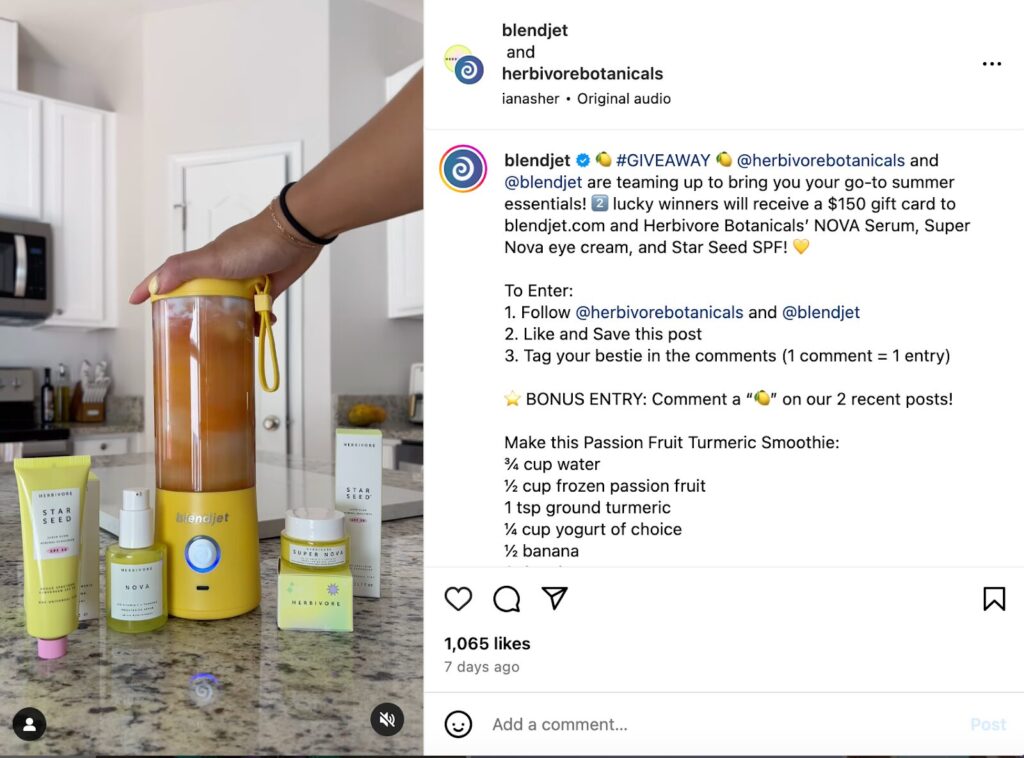
2. Co-Brand Collaboration
McDonald’s partnered with Dreamworks to create a Shrek-themed Happy Meal featuring toys and packaging inspired by the popular movie franchise. In co-branded product promotions, two brands collaborate to create themed products that appeal to both audiences.
To implement
- Identify a popular partner,
- Design-themed packaging, and
- Include promotional items (e.g., toys or collectables) related to the partner’s brand.
This strategy boosts excitement and drives sales by offering unique, limited-time experiences that fans are eager to collect while each brand benefits from increased exposure through the other’s audience.
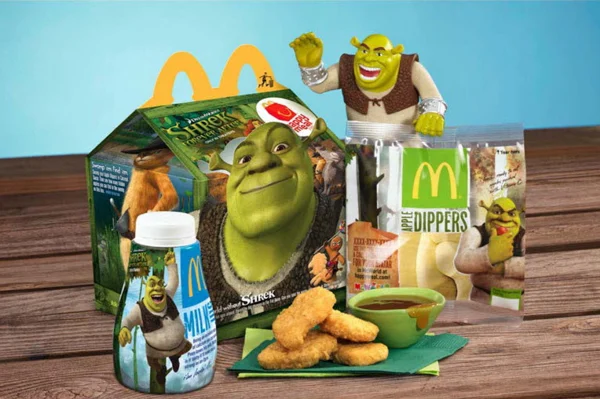
3. Influencer Partnership
e.l.f cosmetic partnered with popular influencer Lars Gummer to create an Instagram Reel showcasing their products in a fun and relatable way, reaching a larger audience and boost brand awareness.
Influencer partnerships leverage the influencer’s reach and credibility to attract attention and build trust.
To implement
- Select an influencer whose audience aligns with your target market.
- Provide them with clear guidelines while allowing room for authentic creative expression.
Influencers can create content like posts, stories, or Reels, featuring your products naturally within their content style.
4. Social Media Cross Promotion
Thursday Boot Company partnered with an influencer to create an Instagram video showcasing their boots in a stylish, lifestyle-focused context, emphasizing quality and versatility.
Brand partnerships like this use high-quality, long-form content to tell a story that resonates with the target audience.
To implement
- Collaborate with an influencer or content creator who embodies your brand’s values and style.
- Let them highlight your product in an organic, relatable way—such as a “day in the life” or a styling video.
This approach boosts engagement and builds a deeper connection with viewers by demonstrating how the product fits seamlessly into their lifestyle.
5. Email Collaboration
AllTrails and Calm partnered to create a campaign that encourages users to combine outdoor activities with mindfulness. Users who record a hike on AllTrails receive three free months of the Calm app, blending nature with mental wellness.
This co-brand email collaboration of two complementary brands offers a combined incentive to drive engagement.
To implement
- Choose a partner that aligns with your brand’s mission and target audience.
- Design a mutually beneficial offer, like a free trial or discount, which adds value to both brand’s communities.
By encouraging users to explore both products, this strategy deepens customer relationships and expands reach organically.

Build trust & FOMO
Highlight real-time activities like reviews, sales & sign-ups.
6. Product Collaboration
Apple and Nike collaborated to create the Apple Watch Nike edition, combining Apple’s technology with Nike’s sports branding and custom watch faces for a unique fitness experience.
The product collaboration, the two brands manage their strengths to create a product that appeals to both audiences.
To implement
- Select a partner with a complementary product or expertise that enhances your offering.
In this example, Apple’s smartwatch technology pairs with Nike’s fitness branding, attracting users interested in both tech and sports. The collaboration includes custom design elements, like Nike watch faces and bands, creating a distinctive product that increases appeal, broadens reach, and strengthens both brands’ positions in the fitness tech market.
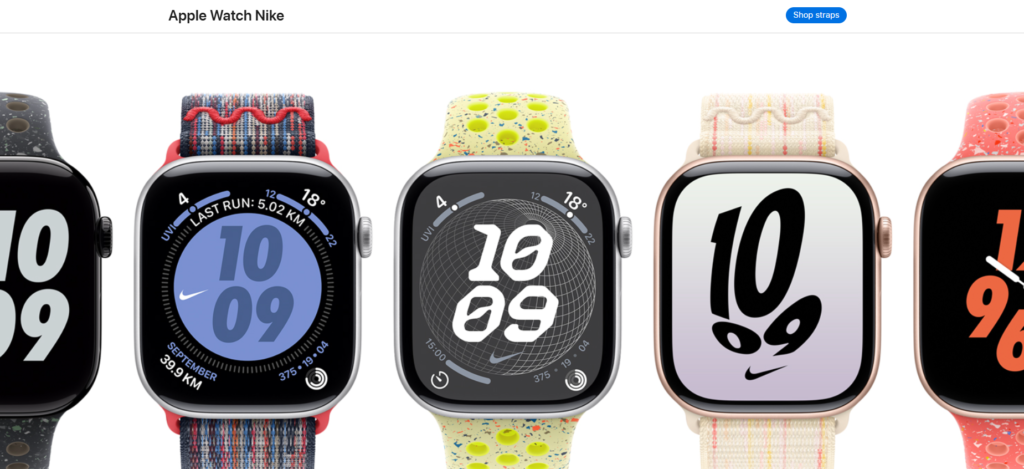
7. Co-Branded Collaboration
Another successful cross-promotion example is Adidas’s partnership with Ivy Park to promote each other. The collection offers inclusive, versatile pieces catering to a diverse audience.
In a co-branded fashion collaboration, two brands unite to design a product line that merges their identities, appealing to both fan bases.
To implement, choose a partner with a complementary brand image and develop a collection representing shared values (e.g., inclusivity, style, and functionality). This collaboration allows each brand to expand its reach, attract new customers, and generate excitement through exclusive, limited-edition offerings.
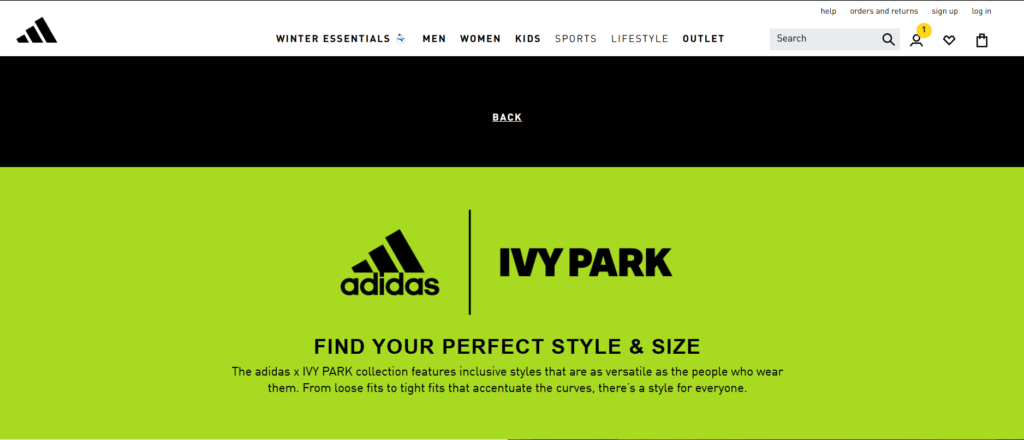
8. E-Book Collaboration
The Chat Shop and Live Chat collaborated to create an eBook, “A Complete Guide to Online Sales”, providing valuable insights for eCommerce businesses looking to boost their sales.
To implement this strategy, brands can collaborate to craft content like guides, webinars, or eBooks that address shared customer needs. The guide helps to provide value and positions brands as thought leaders.
By promoting the content on both channels, they expand reach, enhance credibility, and generate leads while providing value to readers.
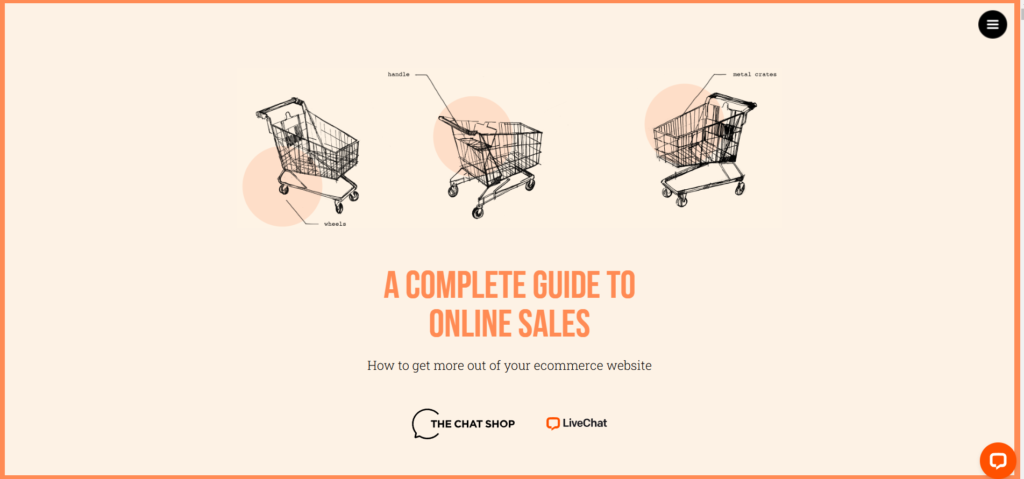
9. Limited Edition Co-Brand Product
Coca-Cola and Oreo collaborated to create a limited edition product featuring a unique flavour for their audiences. This collaboration brings together two iconic brands for a unique, exclusive treat.
Limited edition co-branded products generate excitement by offering a unique item that combines elements of both brands. Collaborating with a brand that complements your brand and designing a product with exclusive branding, flavour, or style.
This strategy builds hype, expands brand reach, and enhances customer loyalty through a memorable, novelty experience.
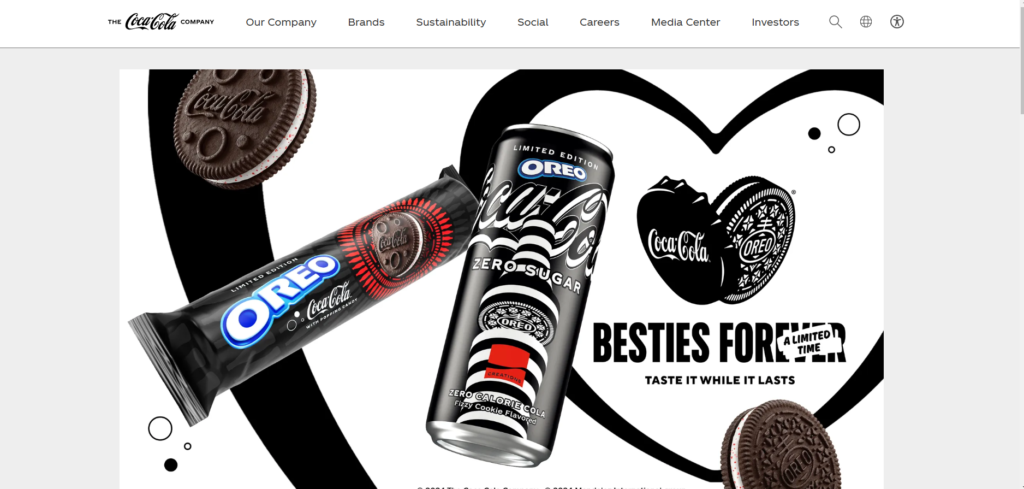
10. Co-Brand Product Collaboration
Byredo and Ouai collaborated to release a limited-edition leave-in conditioner, blending Byredo’s signature scents with Ouai’s hair care expertise. The exclusive product quickly sold out, creating high demand among both brand’s followers.
The collaboration product combines the unique strengths of each brand, appealing to a shared audience. The brands can partner with a brand that complements your product line. Develop a limited-run product that incorporates elements from both brands.
The scarcity creates urgency, prompting customers to act fast, boost excitement, expand brand exposure, and build exclusivity, resulting in strong customer engagement.
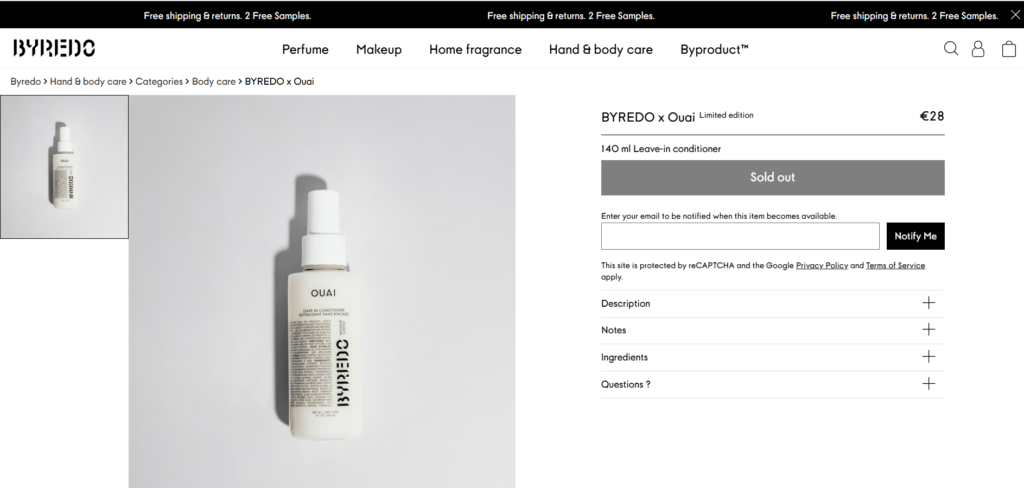
How to Choose the Right Cross-Promotion Partner
Selecting the right cross-promotion partners is essential for a successful cross-promotion campaign. A well-chosen partner elevates your cross-promotion ideas, amplifies reach, and effectively increase brand awareness.
Here’s how to find the right cross-promotion partner –
- Conduct Research to Find Brands that align with Audience and Goals: Select a partner with an overlapping target audience to ensure both brands benefit.
- Match Brand Values: Choose a brand with similar values and a complementary image to maintain authenticity.
- Set Clear KPIs: Define key performance indicators like engagement or sales to measure campaign success.
- Seek Complementary Offerings: Partner with brands that provide products or services that enhance yours.
- Check Engagement, Not Just Reach: Prioritize partners with an engaged audience over mere follower counts.
- Ensure Strategy Compatibility: Align with partners that use similar marketing strategies and platforms.
- Verify Resource Commitment: Choose a committed partner with the resources to support the campaign.
The right partner companies can help amplify your cross-promotion ideas and deliver mutual value through a strategic and well-aligned campaign. It helps to create a powerful marketing strategy that aligns with your brand values, drives results, and increases brand awareness.
Final Thoughts on Cross-Promotion
Cross promotion campaigns are a powerful way to expand reach, increase brand awareness, and build meaningful connections with new audiences. You can create engaging campaigns by partnering with brands that align with your values and complement your offerings to connect with the audiences.
The key to a successful cross-promotion strategy is finding the right partner who shares your goals, has a compatible audience, and brings added value. Whether you’re aiming to boost engagement, drive sales, or simply get your brand in front of more people, a well-crafted cross promotion strategy can be a game-changer.
Start exploring potential partners, define your campaign goals, and watch as your brand grows through the power of collaboration.
